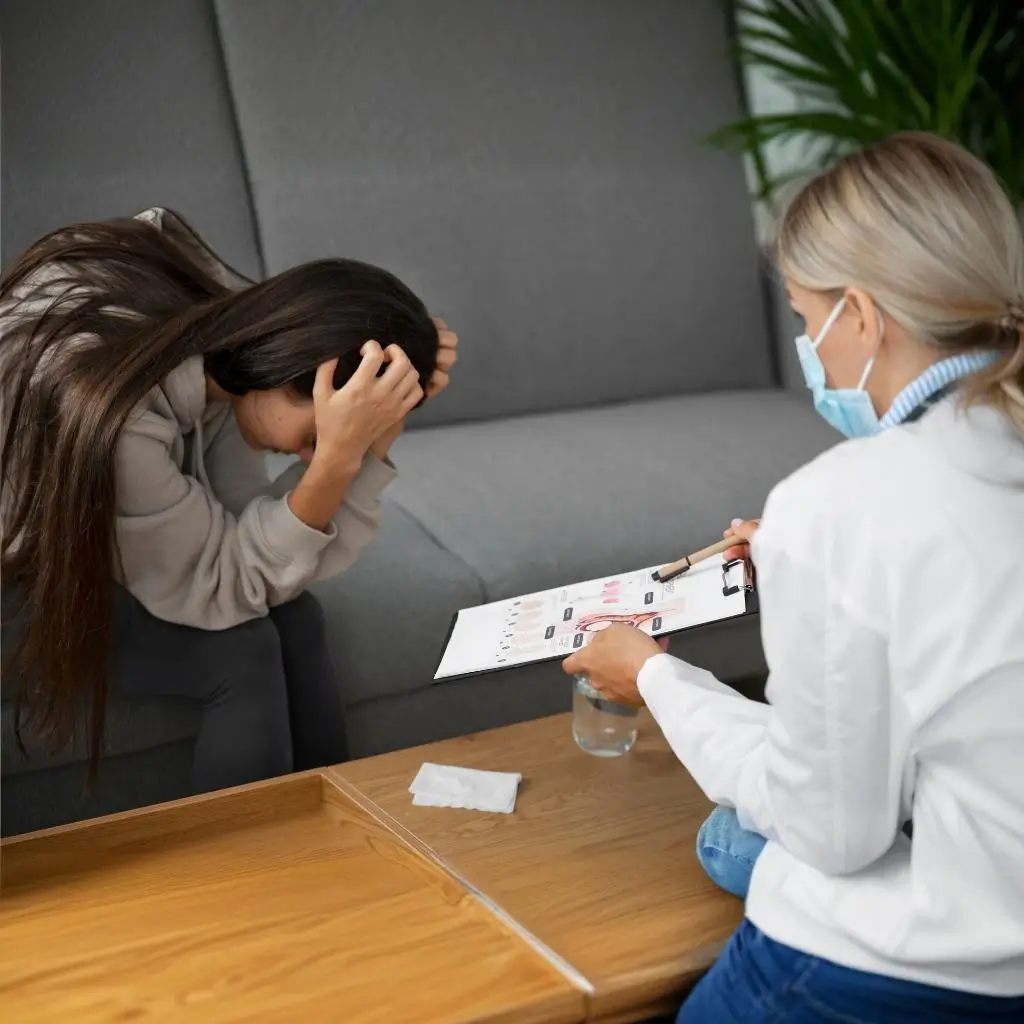Your one-stop solution to Panic Disorders
Trusted panic attack treatment in New Jersey helps you regain control and live a peaceful life.
Request a Callback
What is a Panic Attack?
Panic attacks can strike anyone at any time, leaving you feeling overwhelmed and out of control. If you’ve ever felt like you were about to pass out, have a heart attack, or lose your mind, you may be experiencing panic disorder. It’s more than just anxiety; it’s an intense fear that disrupts your daily life.
About 1 in 75 people experience panic disorder, which affects both the mind and body. Panic attacks typically last only a few minutes, but the fear of another attack can linger, leading to ongoing anxiety. Symptoms include sudden, recurring attacks and constant worry about future ones. When these attacks occur repeatedly, they can develop into panic disorder, where fear and anxiety begin to interfere with daily life and well-being.
A panic attack can feel intense, but it’s not life-threatening. However, when these attacks happen frequently, they could develop into panic disorder. This can have a serious emotional and physical impact, affecting daily life and overall well-being. Seeking treatment is an important step in understanding and managing panic disorder. With the right care, you can regain control, find peace, and no longer live in constant fear of the next attack.


Understanding Panic Disorder Treatment
Panic disorder is a sudden, intense feeling of fear that happens without warning. While anxiety is a normal stress response, panic disorder is different — it strikes unexpectedly and can feel overwhelming. According to the DSM-5, panic disorder is characterized by recurrent, unexpected panic attacks.
The National Institute of Mental Health reports that Panic disorder, which are sudden and intense periods of fear, affects about 13% of individuals at some point in their lives. While panic disorder often starts in adulthood, it can also develop in children. Genetics and biology may increase the risk, though no specific gene or chemical is linked. However, Panic disorder is typically diagnosed when someone experiences repeated panic attacks. Over time, the fear of having another attack can cause individuals to avoid social situations and certain places, affecting their daily lives.
Panic attacks aren’t life-threatening, but they can disrupt your life. If they occur regularly without a clear trigger, it can lead to panic disorder, which can worsen over time. Seeking treatment is key to regaining control and reducing fear. Not everyone with panic attacks has panic disorder. For a panic attack to be called a panic disorder, the DSM-5 lists these criteria:
- Repetitive and frequent panic attacks
- One attack followed by a month or more of worry, fear of losing control, or changes in behavior like avoiding triggers
- Drugs, a medical condition, or another mental health disorder don’t cause panic attacks.
Even if you don’t have a diagnosed panic disorder, treatment can help prevent worsening symptoms and the development of phobias.
Common Symptoms of Panic Disorder
At Relevance Recovery, we provide high-quality treatment for panic disorder and help you understand the symptoms of this condition. Knowing what to look for can help you take the first step toward recovery.
Here are some common symptoms you might experience:
- Your heartbeat may race or feel like it’s pounding
- You may suddenly fear that you’re dying or losing control
- You could feel chest pain or tightness
- Tingling or numbness may occur, especially in your hands or feet
- Shaking or trembling is common during an attack
- You may feel detached from yourself
- Sweating or chills can happen
- Breathing might feel difficult
- A choking sensation or difficulty swallowing may make it harder to breathe
- Nausea or a sick feeling in your stomach
- Lightheadedness or dizziness can make you feel unbalanced
- You may experience vertigo, a sense of spinning or losing your balance


How to Manage Panic Attack Symptoms
Dealing with panic attacks can be challenging, but there are steps you can take to feel more in control.
Here are some easy-to-follow tips:
- Understand Your Anxiety: Panic can sometimes feel much stronger than the situation warrants. If you’re anxious without a clear reason, seeking advice and learning how to manage these feelings is helpful.
- Break the Anxiety Cycle: Try deep breathing, progressive muscle relaxation, or mindfulness. These techniques help calm your body and interrupt the cycle of panic.
- Seek Support: If panic attacks are happening more often, talking to a therapist or counselor can be really helpful. They can offer strategies to reduce the intensity and frequency of attacks.
- Gradually Reconnect with Daily Life: Start with small tasks, and as you regain confidence, you’ll likely notice fewer panic attacks. Take your time—there’s no rush.
- Choose Healthy Coping Mechanisms: Instead of turning to unhealthy habits, try activities like exercise, creative hobbies, or mindfulness to relieve stress and anxiety.
- Talk to Loved Ones: Sharing your experience with friends or family can lighten the burden. They can offer support and help reduce the stress that might trigger panic.
- Take Care of Your Body: Good sleep, healthy eating, and regular exercise help keep both your body and mind strong, making it easier to handle stress.
- Enjoy What You Love: Even if it feels hard, try doing things you once enjoyed. Facing your fears in small doses can help take away their power over time.
Effective Panic Disorder Treatment at Relevance Recovery
At Relevance Recovery, we offer a comprehensive approach to treating panic attacks, combining proven therapies, FDA-approved medications, and holistic practices to help you regain control.
- Cognitive Behavioral Therapy (CBT): CBT is highly effective, with 60-80% of individuals seeing significant improvement in anxiety and panic symptoms. It helps identify and reframe negative thought patterns that trigger panic attacks.
- FDA-Approved Medications: Medications like SSRIs, SNRIs, and beta-blockers are commonly prescribed to manage panic disorder symptoms. These FDA-approved options ensure safety and effectiveness in treatment.
- Mindfulness & Meditation: These practices help reduce anxiety and promote calmness, teaching you to stay grounded during stressful moments.
- Breathing & Relaxation Techniques: Deep breathing and muscle relaxation can provide immediate relief during a panic attack, helping to calm the body and mind.
- Healthy Lifestyle Changes: Regular exercise, balanced nutrition, and good sleep habits can significantly reduce the frequency and intensity of panic attacks.
- Support Groups: Group therapy and support groups provide a sense of community, offering valuable coping strategies and emotional support.
- Biofeedback: This technique helps you control physiological responses like heart rate, reducing physical symptoms of panic attacks.
- Holistic Approaches: Practices like yoga and acupuncture can complement traditional panic disorder treatments, promoting relaxation and emotional balance.
At Relevance Recovery, we combine therapy, medication, and holistic approaches to help you overcome panic attacks and build emotional resilience.


Personalized Mental Health Treatment in New Jersey
We offer customized panic disorder treatment with a minimum of 2-3 hours a week of individual sessions. Our comprehensive care includes one-on-one work with specialized professionals dedicated to helping you achieve mental wellness.
Our treatment approach includes:
- Ongoing support to help you navigate emotions and mental health challenges.
- Guidance to nurture your spiritual well-being.
- Coping strategies through Dialectical Behavior Therapy (DBT) to manage emotional struggles.
- Overseeing treatment plans for comprehensive care.
- Psychiatric evaluations and medication management if needed.
- Assistance with care coordination to help you stay on track.
How Relevance Recovery Can Help You
If you experience panic attacks, seeking help from a recovery center can be crucial in managing symptoms and preventing future issues. Panic attacks can cause anxiety, distress, and physical symptoms like heart palpitations, sweating, and shaking. While panic attacks can indicate panic disorder, not everyone who experiences them has the disorder.
In New Jersey, our recovery center is dedicated to supporting your mental health and well-being. If you’re struggling with panic attacks or related challenges, recovery plays a key role in managing symptoms and improving your quality of life. Our award-winning programs provide effective strategies to address mental health concerns, overcome substance abuse, and prevent relapse. We are committed to guiding you on a transformative journey toward lasting recovery and a healthier, more fulfilling life.
We Work With Most Major Insurance Providers
- Aetna
- Amerihealth
- Anthem
- Beacon
- Behavioral Health Systems
- BCBS—Most BlueCross & BlueShield Plans
- Carelon Behavioral Health
- CareFirst
- Cigna
- ComPsych
- Coventry
- Empire BlueCross BlueShield
- GHI
- Highmark
- Humana
- Magellan
- MagnaCare
- Meritain Health
- MultPlan
- NYSHIP (New York State Insurance Plan)
- Optum
- Oxford
- PHCS
- Self-Pay
- TRICARE
- UHC
- UMR
- VA Insurance
- 90 Degree Benefits
- Aetna
- Amerihealth
- Anthem
- Beacon
- Behavioral Health Systems
- BCBS—Most BlueCross & BlueShield Plans
- Carelon Behavioral Health
- CareFirst
- Cigna
- ComPsych
- Coventry
- Empire BlueCross BlueShield
- GHI
- Highmark
- Humana
- Magellan
- MagnaCare
- Meritain Health
- MultPlan
- NYSHIP (New York State Insurance Plan)
- Optum
- Oxford
- PHCS
- Self-Pay
- TRICARE
- UHC
- UMR
- VA Insurance
- 90 Degree Benefits
At this time, we do not accept Medicaid or Medicare.
Relevance saved my life. Everyone here is so helpful and genuine. I highly highly recommend!
This program was absolutely life changing. It fully brought me out of a dark tunnel and into a fresh perspective of enlightenment.
Coming from another treatment center from southern Jersey, I was really anxious and afraid, being completely out of my element, it felt like I was a fish out of water. Relevance’s team really made me feel comfortable while I was being treated, and I thank them for that. I felt really supported and cared for during the time I attended program!
Grateful for Relevance and their open door to seek the treatment I needed.
Great place! All the people are friendly and the staff helped me greatly in my recovery.
This place is a wonderful place to better yourself if you’re looking for a place that still feels like reality. You are not isolated from the rest of the world, but working on yourself within it. Most of the employees here really make an effort to help you, and the atmosphere is wonderful! I’m so greatful for this place
Relevance was such a welcoming environment every day. Staff was amazing supportive and caring. Definitely helped me prepare for life after treatment.



